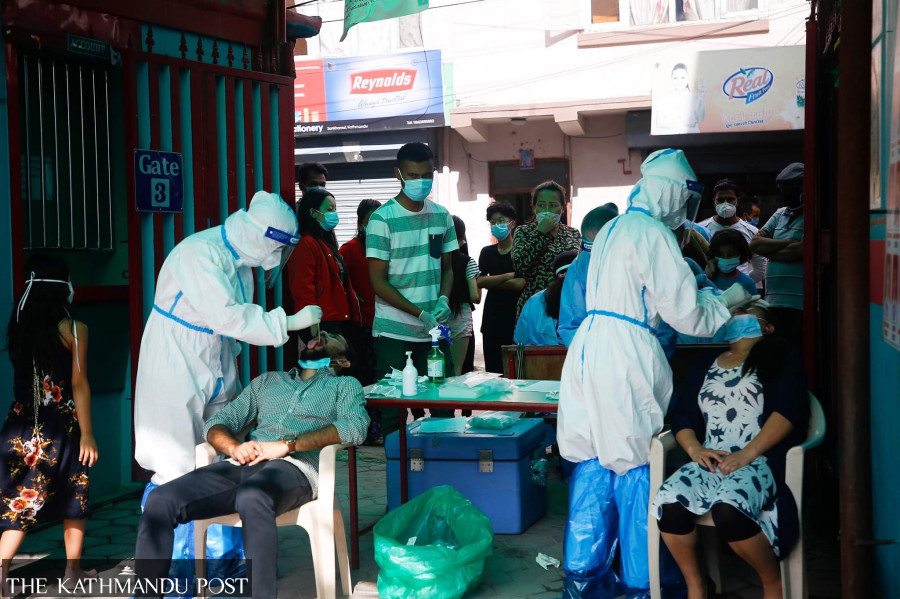Health
Yet another high-level committee formed to deal with surging Covid-19 cases
Experts doubt the new committee will be any different from other committees formed in the past.
Arjun Poudel
Amid a surge in new Covid-19 cases throughout the country, the government has formed a high-level committee led by Minister of State for Health Umesh Shrestha to deal with both Covid-19 and non-Covid cases.
The committee is the latest in the series tasked with combatting the pandemic.
Prime Minister Sher Bahadur Deuba, who also looks after the Ministry of Health and Population, formed the committee through the Cabinet meeting held last Friday.
“This committee will coordinate between the agencies concerned to address both Covid-19 and non-Covid issues,” Dr Krishna Prasad Poudel, spokesperson for the Health Ministry, told the Post.
There is already a high-level committee, ‘Covid-19 Crisis Management Center’ under the leadership of Prime Minister Deuba himself and subcommittees of the center exist at the district level.
Asked how the new committee is different from the other committees and what new things the new committee will do, Paudel said it will not do anything new, but coordinate with the relevant agencies to make the response to the pandemic effective.
Around 3,000 people on an average have been testing positive for the coronavirus every day for nearly four weeks now. Health facilities treating coronavirus patients have already been running in full capacity and those seriously ailing, who need intensive care and ventilator support, are forced to wait for days to get the service.
Public health experts, expressing doubt about the effectiveness of the new committee, said the new high-level committee will see an overlap of responsibilities.
“Instead of forming a mechanism to implement the decisions, the government has been creating committees one after another,” Mahendra Prasad Shrestha, former chief specialist at the Health Ministry, told the Post. “Work on pandemic control has not been effective, not because we have fewer committees but in the absence of mechanisms to implement the decisions of the government and respective committees.”
The Covid-19 Crisis Management Center had decided to set up holding centres with 1,000 beds each in all seven provinces and in Kathmandu Valley by assigning the job to the Nepal Army before the start of the second wave but no holding centre has been ready yet.
“Have you noticed any new thing the Covid-19 Crisis Management Center has done since its formation?” an official at the Department of Health Services asked, seeking not to be named. “It only holds discussion, but takes no action.”
The committee was initially formed under the leadership of a deputy prime minister of the previous government and later under the prime minister himself.
The Health Ministry said that the highly contagious Delta variant of the coronavirus has been circulating throughout the country and is responsible for the ongoing infections. But neither tests have been increased, nor any agency is paying attention to contact tracing.
“Technical committees are needed for giving technical suggestions, and political committees are needed for implementing those suggestions or taking prompt decisions,” Dr Keshab Deuba, a public Health epidemiologist, told the Post. “But in our context, no suggestions of the experts’ committee are taken positively and are rarely implemented.”
All three tiers of government—federal, provincial and local—have formed committees under them.
Dr Roshan Pokhrel, the health secretary, is the vice chairman, Dr Dipendra Raman Singh, chief specialist; joint vice-chairman and director generals—Dr RP Bichha, Dr Basudev Upadhyay and Bharat Bhattarai—are members of the new high-level committee. Dr Krishna Prasad Paudel, spokesperson for the health Ministry, Dr Rudra Marasini, chief consultant orthopaedic surgeon from the National Trauma Center, are other members of the new committee. Dr Guna Raj Lohani is member secretary.
“We have to see how effectively the new committee will work, and what change it will bring in the treatment and control of the coronavirus pandemic,” Dr Mingmar Gyelgen Sherpa, former director general at the Department of Health Services, told the Post.
“We need mechanisms that implement decisions promptly, increase testing, make contact tracing effective, and enforce public health measures, as new cases have been surging every day.”
On Thursday, 2,321 people tested positive in 11,946 polymerase chain reaction tests. Additional 754 people tested positive in 4,492 antigen tests performed throughout the country. In the last 24 hours, 33 people died of Covid-19. Active cases stand at 40,500 as of Thursday.
“We do not have to do new things but follow the basics—enforce public health measures strictly, increase testing, isolate the infected people and make contact tracing effective,” said Deuba, an epidemiologist.
“Even a ward committee or area development committee, youth committee can play a role and authorities concerned can facilitate them. We have to wait and see if this new committee will do all these things or will be similar to several other committees formed in the past.”




 11.84°C Kathmandu
11.84°C Kathmandu















